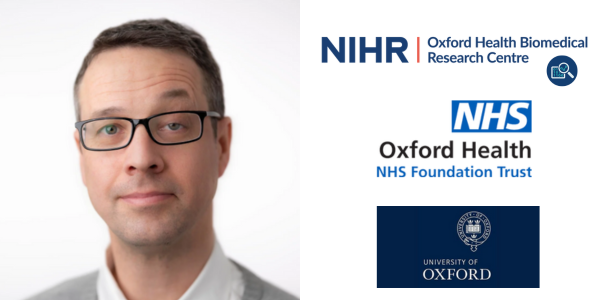Dr Howard Ryland is also a researcher in the Oxford Health Biomedical Research Centre’s (OH BRC) Data Science Theme and Honorary Senior Clinical Research Fellow in University of Oxford’s Department of Psychiatry.
Dr Ryland shares how OH BRC has supported his step into clinical academia, allowing him to combine research with clinical forensic psychiatry in the prison service.
He discusses his ongoing implementation of risk prediction tools to improve patient safety within prisons and his work identifying the top research questions within forensic mental health.
Tell us a little about yourself, and what attracted you to working in Forensic Psychiatry at Oxford Health NHS Foundation Trust and for the Oxford Health Biomedical Research Centre?
I first came to Oxford in 2018 after completing my training in forensic psychiatry in London. I was excited by the opportunity to work with Professor Seena Fazel and his forensic psychiatry research group at the University of Oxford’s Department of Psychiatry. I feel that we need much more research in forensic psychiatry and Oxford is at the forefront of innovation in this area.
I completed my DPhil with Seena in 2021, after navigating various challenges posed by the pandemic.
OH BRC has supported my transition to clinical academia, allowing me to develop myself as a researcher, while still working clinically in the prison service at OHFT.
What is the focus of the work in your department?
I am working on a series of implementation projects around the OxRisk suite of tools, used within the prison service and health services, to predict likelihoods of behaviours such as self-harm and aggression. The hope is that these could be used to target interventions to improve patient safety.
I am co-leading a James Lind Alliance Priority Setting Partnership for forensic psychiatry which aims to establish the “Top 10 Most Important Research Questions” within Forensic Mental Health Services.
I am also looking forward to starting a new interdisciplinary project with the Oxford Martin School, developing the evidence base for alternatives to prison. This will involve working with ethicists, criminologists, economists, policy makers and people with lived experience.
What does a day in your current job look like? What are you currently working on?
No day is the same, which I like, but it can be confusing to keep track of everything. My clinical work is based across three specialised prisons in Oxfordshire and Buckinghamshire. I run outpatient clinics for people in prison where I provide psychiatric assessment, diagnosis and treatment. In the most severe cases this can include referring someone for transfer to a secure hospital.
My academic work is equally varied and might involve writing scientific papers, submitting applications for ethical approvals, presenting at meetings and conferences, attending research group meetings or interviewing participants.
I also organise the University of Oxford Postgraduate Psychiatry Course, run through the Department of Psychiatry that supports resident doctors preparing for the Membership Examinations of the Royal College of Psychiatrists.
One of the brilliant things about OH BRC is that it helps to bridge the gap between academia and the clinical world. During my DPhil I developed the FORensic oUtcome Measure (FORUM), an outcome measurement tool which combines both patient and clinician perspectives. FORUM is currently being implemented at OHFT through the True Colours platform which integrates patient and clinician scores to produce graphs that can be used with patients to help plan their care. It is great to see my work reaching clinical practice and hopefully improving things for patients!
How did you get to where you are today?
It may sound like a cliché, but luck and persistence certainly helped. I am a relative latecomer to academia, having applied for numerous research funding opportunities during my clinical training, without success.
I applied twice for a Wellcome Trust scheme in the department, the second time with what became my DPhil project. Professor Fazel suggested I apply for the NIHR Doctoral Research Fellowship. It sounded simple and I thought to myself, “how much extra work could it be?”. After countless hours and a 70-page application form, it was submitted. I didn’t get on to the Wellcome Trust scheme in the end, but did get the NIHR Fellowship, and finally had my chance.
Who or what inspires you?
My amazing children, whose brains are developing at the speed of light. It is a real privilege to watch them grow and navigate the world. I am always amazed at their incredible sense of fun, and they make me laugh every day.
Professionally, I am inspired by the many brilliant people I work with, including some fantastic mentors. I have also learned so much from collaborating with people with lived experience of the types of services where I work and do research.
If you were not in your current job, what would you like to be doing?
I would love to say designing buildings, as my wonderful late father was an architect. As a child he used to take me on trips around London to see all kinds of fascinating buildings. My artistic skills are minimal, so this was never a realistic career path, but I still enjoy well planned spaces and learning about architecture.
When I was the consultant on the Psychiatric Intensive Care Unit in Oxford in 2023, I had the chance to work with architects designing the new hospital that is proposed as part of the Warneford Park development. I also recently attended an event to celebrate the opening of the Spencer Building at Corpus Christi College, Oxford, where I am a Junior Research Fellow. It was interesting chatting to the architects about the challenges of updating an ancient building to meet the demands of modern university life.
Contact us for more information about our research: research@oxfordhealth.nhs.uk
Published: 20 August 2025

